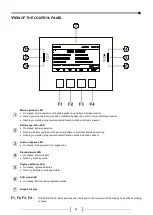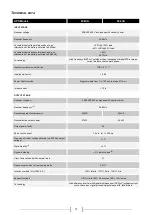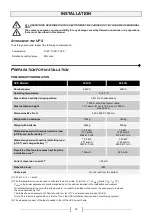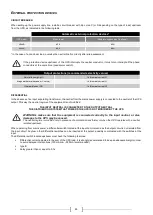
78
I
NTERNAL
B
ATTERIES
CAUTION:
If the UPS has INTERNAL BATTERIES, follow all the
PRECAUTIONS AND SAFETY RULES
listed
below.
The UPS has HAZARDOUS electrical voltages inside it, even when the input and/or battery switches are off. The inside
of the UPS is protected by safety panels which should not be removed by untrained personnel. All installation and
maintenance or operations involving access inside the UPS require the use of tools and may ONLY be performed by
trained personnel.
The UPS contains an internal source of energy: batteries. All terminals and sockets may be live even without connecting
the UPS to the mains.
The total battery voltage may be potentially dangerous: it may generate an electric shock. The battery compartment is
protected by safety panels which should not be removed by untrained personnel. All installation and maintenance of the
batteries involve access inside the UPS and require the use of tools: such operations may ONLY be performed by trained
personnel.
Replaced batteries must be considered TOXIC WASTE and treated accordingly. Do not dispose of batteries in a fire:
they may explode. Do not attempt to open the batteries: they are maintenance-free. In addition, the electrolyte is harmful
to the skin and eyes and can be toxic.
Do not turn on the UPS if it is leaking fluid or if you see a residual white powder.
Do not allow water, liquids in general and/or other foreign objects to get inside the UPS.
Do not open the battery fuse holder while the UPS is powering the load in battery operation mode. The interruption of
the battery DC may cause an electrical arc resulting in broken equipment and/or fire. In addition, if there is no mains
power, the energy to power the load is provided by the batteries, therefore opening the battery caps would lead to the
shutdown of the load.
Follow these recommendations when working on the batteries:
Remove wristwatches, rings and other metal objects
Use tools with insulated handles
Wear rubber shoes and gloves
Do not lay tools or metal objects on top of the batteries
Disconnect the charging source before connecting or disconnecting the battery terminals
Check whether the battery has been inadvertently earthed. If this is the case, disconnect the source from earth.
Contact with any part of the earthed battery may cause an electric shock. The likelihood can be reduced if the
earthing connections are interrupted during installation and maintenance (applicable to remote battery-powering
and equipment, without earthing circuits).
Risk of explosion if the battery is replaced by another of the incorrect type. Refer to the following table to identify the
correct quantities and models:
Battery Type
12V
Valve regulated sealed
lead-acid rechargeable
Number of batteries
positive branch
20+20
Number of batteries
negative branch
20+20
Total rated battery voltage
Positive branch
240 VDC
Total rated battery voltage
Positive branch
240 VDC
For correct interconnection of the batteries, refer to the wiring diagrams available to service personnel only or to the
battery kit installation manual.
Summary of Contents for SATURN
Page 2: ......
Page 40: ...40 MENU DISPLAY ...
Page 60: ...60 ...
Page 98: ...98 MENU DISPLAY ...
Page 118: ...118 ...
Page 156: ...156 DISPLAY MENÜ ...
Page 176: ...176 ...
Page 214: ...214 MENU AFFICHEUR ...
Page 234: ...234 ...
Page 272: ...272 MENÚ PANTALLA ...
Page 292: ......
Page 293: ......
Page 294: ...0MNSATURNK30NP5LUC ...
















































